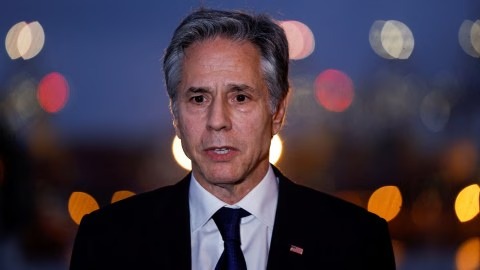“We value our partnership with the U. S. and will continue to have frank exchanges on issues of concern to us,” it said
 KRC TIMES Desk
KRC TIMES Desk

WASHINGTON : There has been a “concerning increase” in anti-conversion laws, hate speech, and demolitions of homes and places of worship for members of minority faith communities in India, US Secretary of State Antony Blinken has said.
In his remarks at the release of the annual State Department report on international religious freedom, Blinken said on Wednesday that at the same time, people around the world are also working hard to protect religious freedom.
The report stated that senior US officials continued to raise concerns about religious freedom issues with their Indian counterparts in 2023.
“In India, we see a concerning increase in anti-conversion laws, hate speech, demolitions of homes and places of worship for members of minority faith communities. At the same time, people around the world are also working hard to protect religious freedom,” the secretary of state said.
Ten of 28 states have laws restricting religious conversions for all faiths. Some of these states also impose penalties specifically against religious conversions for the purpose of marriage, the 2023 Report on International Religious Freedom stated for India.
During the year, some members of religious minority groups challenged the government’s ability and willingness to protect them from violence, investigate crimes against members of religious minority groups, and protect their freedom of religion or belief, it stated.
India has previously rejected the US state department’s annual human rights report on the country, saying they continue to be based on “misinformation and flawed understanding”. “Motivated and biased commentary by some US officials only serves to undermine further the credibility of these reports,” the Ministry of External Affairs said last year.
“We value our partnership with the U. S. and will continue to have frank exchanges on issues of concern to us,” it said.
In this year’s report, the US state department said that Christians and Muslims were arrested under laws banning forced religious conversions, which religious groups said in some cases were used to harass and imprison members of religious minority groups on false and fabricated charges or for lawful religious practices.
Observing that Prime Minister Narendra Modi has reiterated calls to enact a Uniform Civil Code (UCC) at the national level as called for in the Constitution instead of a system of separate personal laws for religious communities, the state department said Muslim, Sikh, Christian, and tribal leaders and some state government officials opposed the initiative on the grounds it was part of a project to turn the country into a “Hindu Rashtra (a Hindu Nation)”.
Some UCC proponents, including opposition politicians, said a UCC would promote greater equality, including for women, by preventing polygamy or inequitable inheritance within personal religious laws.
Welcoming the report, the Indian American Muslim Council (IAMC) said it echoes findings presented in the annual report released by the United States Commission on International Religious Freedom that calls on the State Department to designate India as a “Country of Particular Concern (CPC)” for ongoing and severe violations of religious freedoms for minorities.

“Once again, it is clear from the State Department’s own reporting that India more than qualifies as a CPC,” IAMC executive director Rasheed Ahmed said and added that “now it is time for Secretary Blinken to act on these facts, as well as the facts that have been presented by USCIRF for years, and designate India as a CPC”.
Traditionally regarded as a party of lower taxes, the Conservatives have ramped up duties during their time in office, particularly in recent years to help fund vast Covid expenditure and to fix the mini-budget fiasco.
The UK’s overall tax burden has accelerated sharply over the past six years, hitting the highest level since 1948, according to the Institute for Fiscal Studies think-tank.
While Sunak recently lowered national insurance — a tax on jobs to fund state pensions, healthcare and unemployment benefits — his fiscal policies and those of his predecessors have seen millions dragged into paying higher rates of income tax.



